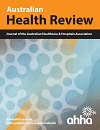
Australian Health Review
Volume 49 Number 3 2025
What is known about the topic? Implementation of eHealth has been unfolding in hospitals for over the past decade, and impact evaluations are needed to provide insights into justifying expenditure. What does this paper add? This paper extends two consecutive narrative reviews of systematic reviews and provides a meta-review of the impacts of eHealth technologies published between 2010 and 2021. We observed largely mixed findings for CPOE, EMR, and ePrescribing, and largely positive findings for CDSS. What are the implications for practitioners? eHealth has the potential to improve a breadth of outcomes, but there is no guarantee and effortful work is needed.
What is known about the topic? The ageing population and increasing incidence of chronic illness pose significant end-of-life healthcare challenges. advance care planning (ACP) completion rates are low across Australia, varying by location and healthcare setting. What does the paper add? This study identifies predictors for ACP and advance care directive completion, including having a will, advancing age, being female, having private health insurance, not working, and having one or more medical conditions. What are the implications for practitioners? These findings could inform interventions to improve ACP uptake, guide healthcare professionals to identify groups that engage less in ACP and inform future research.
AH24327 Abstract | AH24327 Full Text | AH24327PDF (356 KB) | AH24327Supplementary Material (286 KB) Open Access Article
AH24300The role of Medicare policy in fertility treatment decisions: perceptions of Australians considering, undertaking or who have undertaken medically assisted reproduction treatment
What is known about the topic? Fertility treatment can be expensive and not all people who require fertility treatment can access financial assistance from Medicare. What does this paper add? For those eligible for assistance, Medicare enhances accessibility and the amount of treatment undertaken due to increased affordability. People also alter their treatment plans based on Medicare policy. What are the implications for practitioners? The findings support calls for changes to Medicare eligibility to enable equitable access to fertility treatment and a pathway to parenthood for all Australians.
What is known about the topic? Accurate documentation of severe medication allergies is essential to prevent morbidity and mortality from inadvertent re-exposure. My Health Record is a national patient-controlled electronic health record. The accuracy of allergy information in My Health Record has not been previously evaluated. What does this paper add? Inaccurate documentation of confirmed serious medication-related allergies was prevalent, contributed by several system level barriers. What are the implications for practitioners? Accurate allergy documentation in My Health Record and medication safety can be improved through streamlining pathways for hospital clinicians and specialists to enter important information.
What is known? Advance care directives are important so that individuals can plan for the medical treatment they want to receive when they are unable to medically or cognitively make those decisions. Unfortunately for many reasons uptake is low. What does this paper add? Increase in uptake can occur if a health professional individualises support at the right time in the right place and targets the right people. What are the implications for practitioners? Dedicated staff are required to provide time, education and empathy to support people to empower themselves to make decisions about their future medical care.
AH25060 Abstract | AH25060 Full Text | AH25060PDF (432 KB) Open Access Article
What is known about the topic? In the face of escalating demands, our existing care systems are not delivering efficient, safe, high-quality and complex care that meets the diverse needs of individuals and communities. What does this paper add? Our series of co-design activities generated a True North Statement that can serve as a shared action-focused vision to transform health and social care in Australia over the next decade. What are the implications for practitioners? Our True North Statement is a starting point to guide individual, organisation and system redesign. The statements are sequential and require action at individual consumer, workforce and system levels.
What is known about the topic? Australians eligible for public oral healthcare can wait a long time for an appointment. What does this paper add? This analysis provides an update and 10-year review (2015–2024) of numbers waiting for care, and numbers and percentages waiting beyond a desirable time for their clinical priority group, in Queensland. What are the implications for practitioners? Clear and feasible strategies need to be implemented to substantially reduce waiting list numbers in Queensland and more broadly across Australia; including appropriate federal and state government funding of public oral healthcare.




